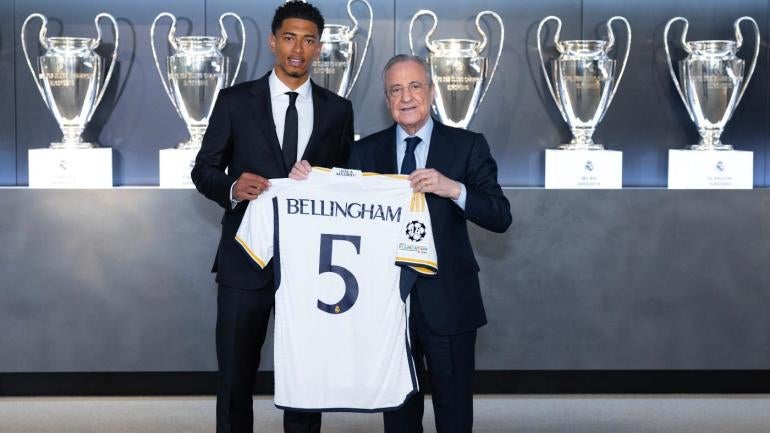
Real Madrid have topped Deloitte's annual Football Money League for the first time since the 2017-18 season in a sign of the growing importance of commercial income to world football's wealthiest sides. Los Merengues might have endured a disappointing campaign on the pitch in 2022-23 but their revenue swelled by $128 million to eclipse $900 million, a record return for the 14-time European champions.

Golazo Starting XI Newsletter
Get your Soccer Fix from Around the Globe
Your ultimate guide to the Beautiful Game as our experts take you beyond the pitch and around the globe with news that matters.
Thanks for signing up!
Keep an eye on your inbox.
Sorry!
There was an error processing your subscription.
Madrid lead Manchester City, another club to post record earnings off the back of a treble-winning season, with Paris Saint-Germain, Barcelona and Manchester United rounding off the top five. That trio in particular points to the growing value of commercial earnings at a time when broadcast rights deals have, at best, slowed their pace of growth and on occasion even drifted into reverse.
Notably, Deloitte largely credit Madrid's rise to top spot to "strong retail performance, higher stadium attendance and recovery of sponsorship income following the easing of COVID-19 restrictions," broadcast income having actually dropped by just over $2 million in a season where they went from Champions League and La Liga winners to defeated semifinalists and runners up to Barcelona.
"They've done a few smart things commercially," Chris Wood, assistant director in Deloitte's Sports Business Group, told CBS Sports. "They brought a lot of their operations back in-house. There was a real trend in terms of joint ventures, third-party agreements in the space of catering, merchandising. They now have a lot more control over that, which goes hand in hand with a year-round operation on their site. They're not just about 25-30 home matchdays a year."
Wood notes that Madrid are not even at the end point of that particular trend. The lengthy renovation of the Santiago Bernabeu has not yet reached its conclusion but this summer the club will inaugurate their refreshed ground with concerts from Taylor Swift and Duki. A high-profile legends match could also be on the cards while the NFL has previously expressed an interest in hosting regular season games in Spain. There are few venues that would make for a more iconic gridiron fixture.
Of course, Madrid are not alone in this regard but they have one advantage over their competition. They are sweating with a capacity of over 84,000, drawing in one of the world's biggest fanbases to their ground. Wood adds,"You see what Tottenham are doing in the Premier League, what Manchester City are doing at their Etihad campus with the Co-op Live [the largest indoor arena in the United Kingdom]. These clubs are now looking at their stadia as assets they can use year-round, not just on those home matchdays: getting people in to drive F1 cars, see concerts, visit museums, all these things that turn your stadium into more than just a football ground, more of a year-round attraction."
Deloitte Football Money League - Top 10
| Rank | Club | 2022-23 Revenue |
|---|---|---|
1 | Real Madrid | $905.9 million |
2 | Manchester City | $899.9 million |
3 | Paris Saint-Germain | $873.6 million |
4 | Barcelona | $871.8 million |
5 | Manchester United | $812.6 million |
6 | Bayern Munich | $810.7 million |
7 | Liverpool | $744.1 million |
8 | Tottenham | $688.1 million |
9 | Chelsea | $642.2 million |
10 | Arsenal | $580.3 million |
It isn't just the stadium that suggest Real Madrid could entrench their position at the top. Florentino Perez may have abandoned the Galacticos policy of the turn of the century but in the likes of Jude Bellingham, Vinicius Junior and Rodrygo, he has signed some of the biggest names in major footballing markets, the sort of players who can drive both results and a global fanbase.
"Real Madrid's team is young, vibrant, it has young superstars from across the globe," Wood adds. "It probably has the best young English talent, a couple of the best young Brazilian talents and all that appeal of the brand. If they continue on this trajectory, albeit with the nuances of the domestic rights deals, they'll be battling for the top spot for a long time."
All this comes in a time where the broadcast revenue bubble is not floating along as breezily as it once did. The Premier League, the media rights behemoth of the past decade, might have trumpeted a new record domestic deal worth $8.4 billion but that four-year agreement saw them sell the broadcast rights to 99 more games than the previous three-year one. La Liga's latest TV deal was worth just one percent more, the Bundesliga's flatlined while Ligue 1 are yet to find a buyer for their rights.
"We're seeing more flatlining in broadcast deals, more modest increases," says Wood. "That's definitely led to a re-emphasis of a club's commercial activities, the bits of their business that they can control directly, to try to extract as much as they possibly can."
Meanwhile, the much-vaunted era when Premier League clubs would no longer need Champions League money is yet to begin. Liverpool, finalists in 2021-22 and eliminated in the round of 16 the following season, were one of three teams in Deloitte's top 20 to see their revenue fall in 2022-23. Atletico Madrid were another to endure a bitterly disappointing European campaign and though West Ham might have clinched the Europa Conference League. they did so 12 months after a deep run in the more well-remunerated Europa League.
The Hammers were leapfrogged by Eintracht Frankfurt into 16th off the back of a run to the Champions League last 16 while a quarterfinal spot and an almighty season of sales took Benfica to 22nd. Arsenal, who have not been higher than ninth or lower than 11th on the Money League since 2016-17, might hope that the sort of deep European run they are shaping up for sees them reestablished as London's richest club.






















